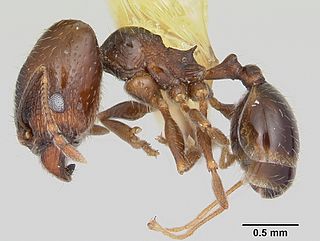
Pheidole is a genus of ants that belongs to the ant subfamily Myrmicinae. The genus is widespread and ecologically dominant. It probably includes more than 1000 species. The genus first evolved in the Americas, eventually spreading across the globe.

The smoothback angelshark is an angelshark of the family Squatinidae found in the eastern Atlantic.

Campsicnemus mirabilis is an extinct species of fly in family Dolichopodidae. It was endemic to the Hawaiian Islands.
Pheidole acutidens is a species of ant in the genus Pheidole. It is endemic to Argentina.
Pheidole argentina is a species of ant in the genus Pheidole. It is endemic to Argentina.

Pheidole elecebra is a species of ant in the genus Pheidole. It is endemic to the United States.

Pheidole inquilina is a species of ant in the genus Pheidole. It is endemic to the United States.
Pheidole lanuginosa is a species of ant in the genus Pheidole. It is endemic to India.
Pheidole microgyna is a species of ant in the genus Pheidole. It is endemic to Guyana.

Pheidole neokohli is a species of ant in the genus Pheidole. It is endemic to the Democratic Republic of the Congo.
Pheidole parasitica is a species of ant in the genus Pheidole. It is endemic to India.
Pheidole symbiotica is a species of ant in the genus Pheidole. It is endemic to Argentina.

Madrepora oculata, also called zigzag coral, is a stony coral that is found worldwide outside of the polar regions, growing in deep water at depths of 80–1500 meters. It was first described by Carl Linnaeus in his landmark 1758 10th edition of Systema Naturae. It is one of only 12 species of coral that are found worldwide, including in Subantarctic oceans. In some areas, such as in the Mediterranean Sea and the North-east Atlantic Ocean, it dominates communities of coral.

Aloeides aranda, the Aranda copper, is a butterfly of the family Lycaenidae. It is found in the whole of South Africa, except in high montane forests and the arid western areas. It is also found in Zimbabwe.

Anthene larydas, the spotted hairtail or common ciliate blue, is a butterfly in the family Lycaenidae. It is found in Senegal, the Gambia, Guinea-Bissau, Guinea, Burkina Faso, Liberia, Sierra Leone, Ivory Coast, Ghana, Nigeria, Cameroon, the Republic of the Congo, the Central African Republic, the Democratic Republic of the Congo, Uganda and western Kenya. The habitat consists of forests and Guinea savanna.
Elattoneura oculata is a species of damselfly in the family Platycnemididae known commonly as the two-spotted threadtail. It is endemic to Sri Lanka, where it is a rare species known from a few locations in the southern and central parts of the island. It lives along streams in primary rainforest habitat, an ecosystem threatened by habitat destruction and degradation.
Andinosaura oculata, the tropical lightbulb lizard, is a species of lizard in the family Gymnophthalmidae. It is endemic to Ecuador.










